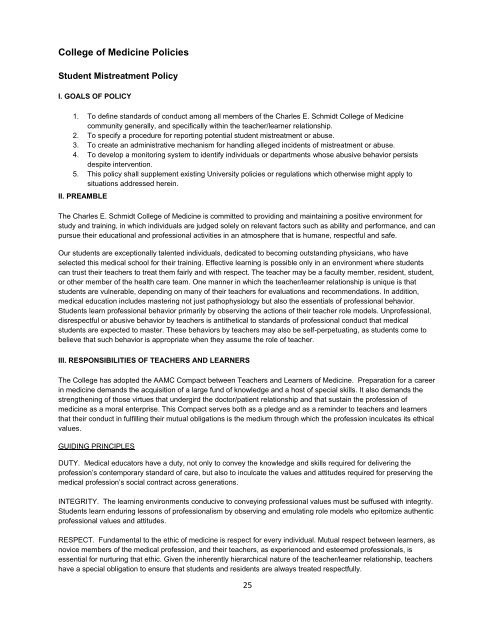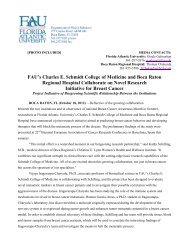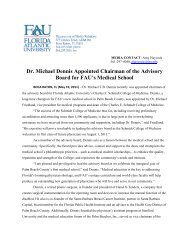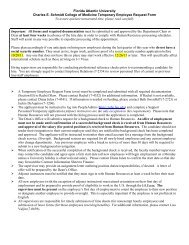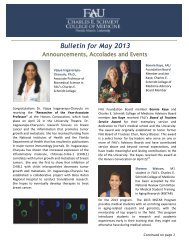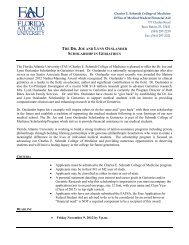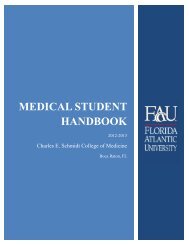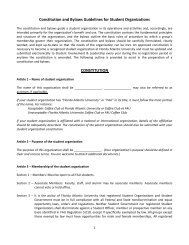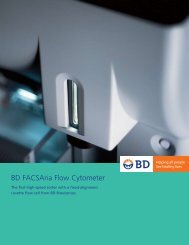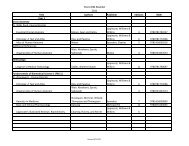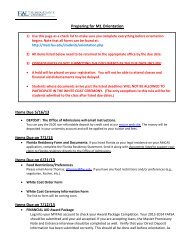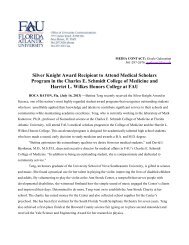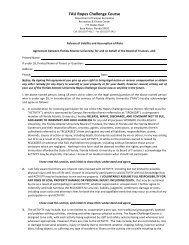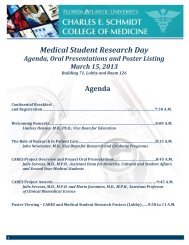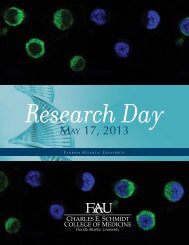Student Handbook - College of Medicine - Florida Atlantic University
Student Handbook - College of Medicine - Florida Atlantic University
Student Handbook - College of Medicine - Florida Atlantic University
You also want an ePaper? Increase the reach of your titles
YUMPU automatically turns print PDFs into web optimized ePapers that Google loves.
<strong>College</strong> <strong>of</strong> <strong>Medicine</strong> Policies<strong>Student</strong> Mistreatment PolicyI. GOALS OF POLICY1. To define standards <strong>of</strong> conduct among all members <strong>of</strong> the Charles E. Schmidt <strong>College</strong> <strong>of</strong> <strong>Medicine</strong>community generally, and specifically within the teacher/learner relationship.2. To specify a procedure for reporting potential student mistreatment or abuse.3. To create an administrative mechanism for handling alleged incidents <strong>of</strong> mistreatment or abuse.4. To develop a monitoring system to identify individuals or departments whose abusive behavior persistsdespite intervention.5. This policy shall supplement existing <strong>University</strong> policies or regulations which otherwise might apply tosituations addressed herein.II. PREAMBLEThe Charles E. Schmidt <strong>College</strong> <strong>of</strong> <strong>Medicine</strong> is committed to providing and maintaining a positive environment forstudy and training, in which individuals are judged solely on relevant factors such as ability and performance, and canpursue their educational and pr<strong>of</strong>essional activities in an atmosphere that is humane, respectful and safe.Our students are exceptionally talented individuals, dedicated to becoming outstanding physicians, who haveselected this medical school for their training. Effective learning is possible only in an environment where studentscan trust their teachers to treat them fairly and with respect. The teacher may be a faculty member, resident, student,or other member <strong>of</strong> the health care team. One manner in which the teacher/learner relationship is unique is thatstudents are vulnerable, depending on many <strong>of</strong> their teachers for evaluations and recommendations. In addition,medical education includes mastering not just pathophysiology but also the essentials <strong>of</strong> pr<strong>of</strong>essional behavior.<strong>Student</strong>s learn pr<strong>of</strong>essional behavior primarily by observing the actions <strong>of</strong> their teacher role models. Unpr<strong>of</strong>essional,disrespectful or abusive behavior by teachers is antithetical to standards <strong>of</strong> pr<strong>of</strong>essional conduct that medicalstudents are expected to master. These behaviors by teachers may also be self-perpetuating, as students come tobelieve that such behavior is appropriate when they assume the role <strong>of</strong> teacher.III. RESPONSIBILITIES OF TEACHERS AND LEARNERSThe <strong>College</strong> has adopted the AAMC Compact between Teachers and Learners <strong>of</strong> <strong>Medicine</strong>. Preparation for a careerin medicine demands the acquisition <strong>of</strong> a large fund <strong>of</strong> knowledge and a host <strong>of</strong> special skills. It also demands thestrengthening <strong>of</strong> those virtues that undergird the doctor/patient relationship and that sustain the pr<strong>of</strong>ession <strong>of</strong>medicine as a moral enterprise. This Compact serves both as a pledge and as a reminder to teachers and learnersthat their conduct in fulfilling their mutual obligations is the medium through which the pr<strong>of</strong>ession inculcates its ethicalvalues.GUIDING PRINCIPLESDUTY. Medical educators have a duty, not only to convey the knowledge and skills required for delivering thepr<strong>of</strong>ession’s contemporary standard <strong>of</strong> care, but also to inculcate the values and attitudes required for preserving themedical pr<strong>of</strong>ession’s social contract across generations.INTEGRITY. The learning environments conducive to conveying pr<strong>of</strong>essional values must be suffused with integrity.<strong>Student</strong>s learn enduring lessons <strong>of</strong> pr<strong>of</strong>essionalism by observing and emulating role models who epitomize authenticpr<strong>of</strong>essional values and attitudes.RESPECT. Fundamental to the ethic <strong>of</strong> medicine is respect for every individual. Mutual respect between learners, asnovice members <strong>of</strong> the medical pr<strong>of</strong>ession, and their teachers, as experienced and esteemed pr<strong>of</strong>essionals, isessential for nurturing that ethic. Given the inherently hierarchical nature <strong>of</strong> the teacher/learner relationship, teachershave a special obligation to ensure that students and residents are always treated respectfully.25


